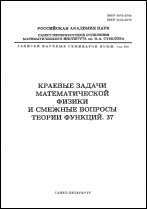|
|
Zapiski Nauchnykh Seminarov LOMI, 1981, Volume 113, Pages 237–242
(Mi znsl3955)
|
 |
|
 |
Short communications
For which $p$ and $r$ is the equation $\Pi_p(L^r,\cdot)=I_p(L^r,\cdot)$ true?
N. G. Sidorenko
Abstract:
It is explained when the classes of $p$-absolutely summing and $p$-integral operators given on the space $L^r(\mu)$ coincide. For a Banach space $X$ there is considered the following subset of the real line:
$$
J_X\stackrel{\mathrm{def}}=\{p\colon1\le p<\infty,\ \Pi_p(X,Y)=I_p(X,Y)\ \forall Y\}.
$$
In the case when $X$ is an infinite-dimensional subspace of the space $L^r(\mu)$, it is proved that $J_X=(1,2]$ if $1\le r\le2$, and $J_X=\{2\}$ if $2<r<\infty$ and $X$ is not isomorphic with a Hilbert space.
Citation:
N. G. Sidorenko, “For which $p$ and $r$ is the equation $\Pi_p(L^r,\cdot)=I_p(L^r,\cdot)$ true?”, Investigations on linear operators and function theory. Part XI, Zap. Nauchn. Sem. LOMI, 113, "Nauka", Leningrad. Otdel., Leningrad, 1981, 237–242; J. Soviet Math., 22:6 (1983), 1856–1860
Linking options:
https://www.mathnet.ru/eng/znsl3955 https://www.mathnet.ru/eng/znsl/v113/p237
|

| Statistics & downloads: |
| Abstract page: | 90 | | Full-text PDF : | 39 |
|




 Contact us:
Contact us: Terms of Use
Terms of Use
 Registration to the website
Registration to the website Logotypes
Logotypes








 Citation in format
Citation in format 